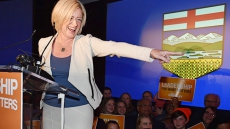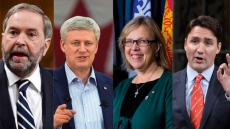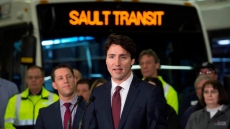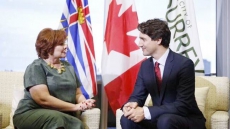MONTREAL — An ever-declining birthrate in Quebec as well as an aging population are putting the spotlight on the province's immigration levels against the backdrop of issues such as the economy, identity, culture and language.
The province's statistics bureau said the 2015 rate was 1.6 children per woman, down one per cent from 2014 and marking the sixth consecutive year it had edged lower.
While that figure may not appear abnormally low, the province also has a rapidly aging population and a growing shortage of skilled workers.
Quebec estimates 1.1 million people will retire between 2013 and 2022 and a recent document published for the Immigration Department said "this situation underscores the need to reassert immigration’s role and its contribution to Quebec."
Immigrants, however, are not spread out evenly across the province, and Statistics Canada estimates visible minority groups will represent 31 per cent of Montreal's population by 2031 — but no more than five per cent everywhere else in Quebec.
Universite de Montreal demographer Marc Termote said he's "very, very worried" about the growing cultural and linguistic divisions between Montreal and other cities.
"What's happening is a profound break between Montreal and the rest of Quebec," he said.

For example, he explained, there are more immigrants in one of Montreal's suburbs, Brossard, than in all of Quebec City, the capital and second-largest city in the province.
Furthermore, Termote said it's a widely publicized myth that increasing immigration will help labour shortages or the economy.
"All the studies show immigration creates a neutral benefit to the economy," he said. "And we will need to welcome many, many more people than we do now for it to affect our aging population figures or fix labour shortages."
Montreal is having trouble integrating the immigrants it already has, with unemployment rates for those born outside Canada at 11 per cent in the city compared to seven per cent for non-immigrants.
Quebec has more control over its immigration policy than other provinces and selects newcomers largely based on language; between 2010 and 2014, 61.3 per cent of immigrants were francophone.
The policy helps preserve Quebec's linguistic distinctiveness, but it also creates tensions, Termote said.
"The pool of French immigrants is not France or Belgium or Switzerland," he said. "It's French Africa, the Maghreb and sub-Saharan, and there are cultural and economic implications to this."

There are also political implications, explains Daniel Weinstock, director of the McGill Institute for Health and Social Policy.
Weinstock said Quebec is witnessing a "hollowing out" of the moderate, nationalist position on immigration and diversity that has characterized politics in the province since the 1960s and the time of Rene Levesque, said Weinstock.
Debate is being polarized between the Liberal government, which wants to increase immigration to 60,000 people a year and welcome them based on their economic potential, and an opposition wary of the province's ability to properly integrate them.
"There was a kind of consensus, largely the idea that Quebec is an immigrant society and a francophone society and being a full-fledged Quebec citizen means accepting that social contract," Weinstock said.
That is changing, he said, as many in the province are beginning to think it's not just about protecting the French language "but protecting all other aspects of Quebec culture which certain immigrants, even when they do speak French, may not share."
An example of the new thinking was the values charter the Parti Quebecois government introduced in 2013 that would have prohibited public-sector workers from wearing conspicuous religious symbols on the job. The charter was never adopted as the PQ was defeated in the 2014 election.
The Liberal government quickly backtracked on its proposal to welcome more immigrants after receiving criticism, stating it was planning on keeping immigration levels constant — at 50,000 people a year — for the time being.
When the Coalition for Quebec's Future, a right-of-centre party that is the third largest political party in the province, questioned the merits of increasing the number of immigrants, Couillard accused its leader, Francois Legault, of "fanning the flames of intolerance."

"With 50,000-60,000 immigrants a year we are going to change the cultural face of Quebec and the challenges of a francophone society that is culturally distinct will increase," Weinstock said.
"How that will play out politically is anyone's guess."






